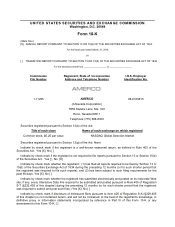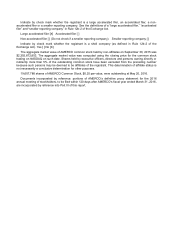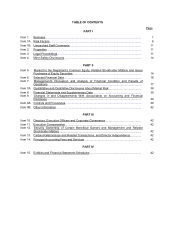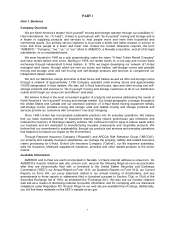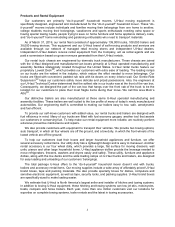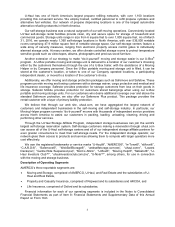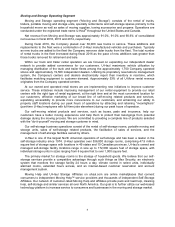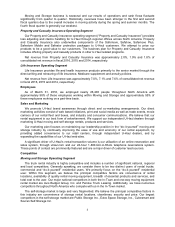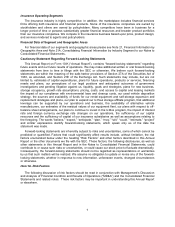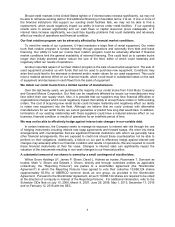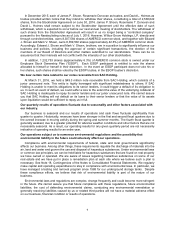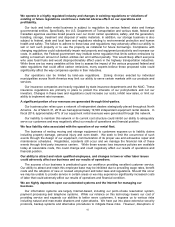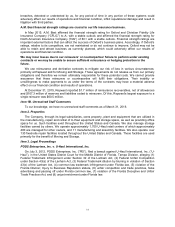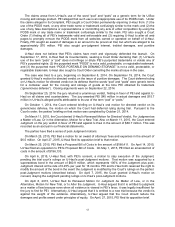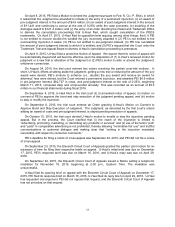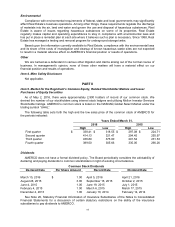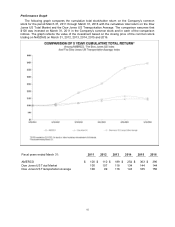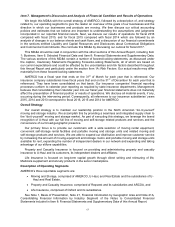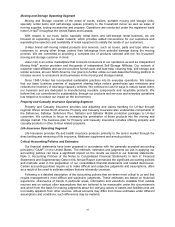U-Haul 2016 Annual Report Download - page 14
Download and view the complete annual report
Please find page 14 of the 2016 U-Haul annual report below. You can navigate through the pages in the report by either clicking on the pages listed below, or by using the keyword search tool below to find specific information within the annual report.8
Should credit markets in the United States tighten or if interest rates increase significantly, we may not
be able to refinance existing debt or find additional financing on favorable terms, if at all. If one or more of
the financial institutions that support our existing credit facilities fails, we may not be able to find a
replacement, which would negatively impact our ability to borrow under credit facilities. If our operating
results were to worsen significantly and our cash flows or capital resources prove inadequate, or if
interest rates increase significantly, we could face liquidity problems that could materially and adversely
affect our results of operations and financial condition.
Our fleet rotation program can be adversely affected by financial market conditions.
To meet the needs of our customers, U-Haul maintains a large fleet of rental equipment. Our rental
truck fleet rotation program is funded internally through operations and externally from debt and lease
financing. Our ability to fund our routine fleet rotation program could be adversely affected if financial
market conditions limit the general availability of external financing. This could lead us to operate trucks
longer than initially planned and/or reduce the size of the fleet, either of which could materially and
negatively affect our results of operations.
Another important aspect of our fleet rotation program is the sale of used rental equipment. The sale of
used equipment provides us with funds that can be used to purchase new equipment. Conditions may
arise that could lead to the decrease in demand and/or resale values for our used equipment. This could
have a material adverse effect on our financial results, which could result in substantial losses on the sale
of equipment and decreases in cash flows from the sales of equipment.
We obtain our rental trucks from a limited number of manufacturers.
Over the last twenty years, we purchased the majority of our rental trucks from Ford Motor Company
and General Motors Corporation. Our fleet can be negatively affected by issues our manufacturers may
face within their own supply chain. Also, it is possible that our suppliers may face financial difficulties or
organizational changes which could negatively impact their ability to accept future orders or fulfill existing
orders. The cost of acquiring new rental trucks could increase materially and negatively affect our ability
to rotate new equipment into the fleet. Although we believe that we could contract with alternative
manufacturers for our rental trucks, we cannot guarantee or predict how long that would take. In addition,
termination of our existing relationship with these suppliers could have a material adverse effect on our
business, financial condition or results of operations for an indefinite period of time.
We may not be able to effectively hedge against interest rate changes in our variable debt.
In certain instances, the Company seeks to manage its exposure to interest rate risk through the use
of hedging instruments including interest rate swap agreements and forward swaps. We enter into these
arrangements with counterparties that are significant financial institutions with whom we generally have
other financial arrangements. We are exposed to credit risk should these counterparties not be able to
perform on their obligations. Additionally, a failure on our part to effectively hedge against interest rate
changes may adversely affect our financial condition and results of operations. We are required to record
these financial instruments at their fair value. Changes in interest rates can significantly impact the
valuation of the instruments resulting in non-cash changes to our financial position.
A substantial amount of our shares is owned by a small contingent of stockholders.
Willow Grove Holdings LP, James P. Shoen, David L. Holmes as trustee, Rosemarie T. Donovan as
trustee, Mark V. Shoen and Edward J. Shoen, directly and through controlled entities as applicable
(collectively, the “Reporting Persons”) are parties to a stockholder agreement (the “Stockholder
Agreement”) in which the Reporting Persons have agreed to vote their collective 10,898,124 shares
(approximately 55.6%) of AMERCO common stock as one group, as provided in the Stockholder
Agreement. Pursuant to the Stockholder Agreement, all such 10,898,124 shares are required to be voted
at the direction of a majority in interest of the Reporting Persons. For additional information, refer to the
Schedule 13Ds filed on July 13, 2006, March 9, 2007, June 26, 2009, May 1, 2013, December 17, 2015
and on February 12, 2016 with the SEC.


